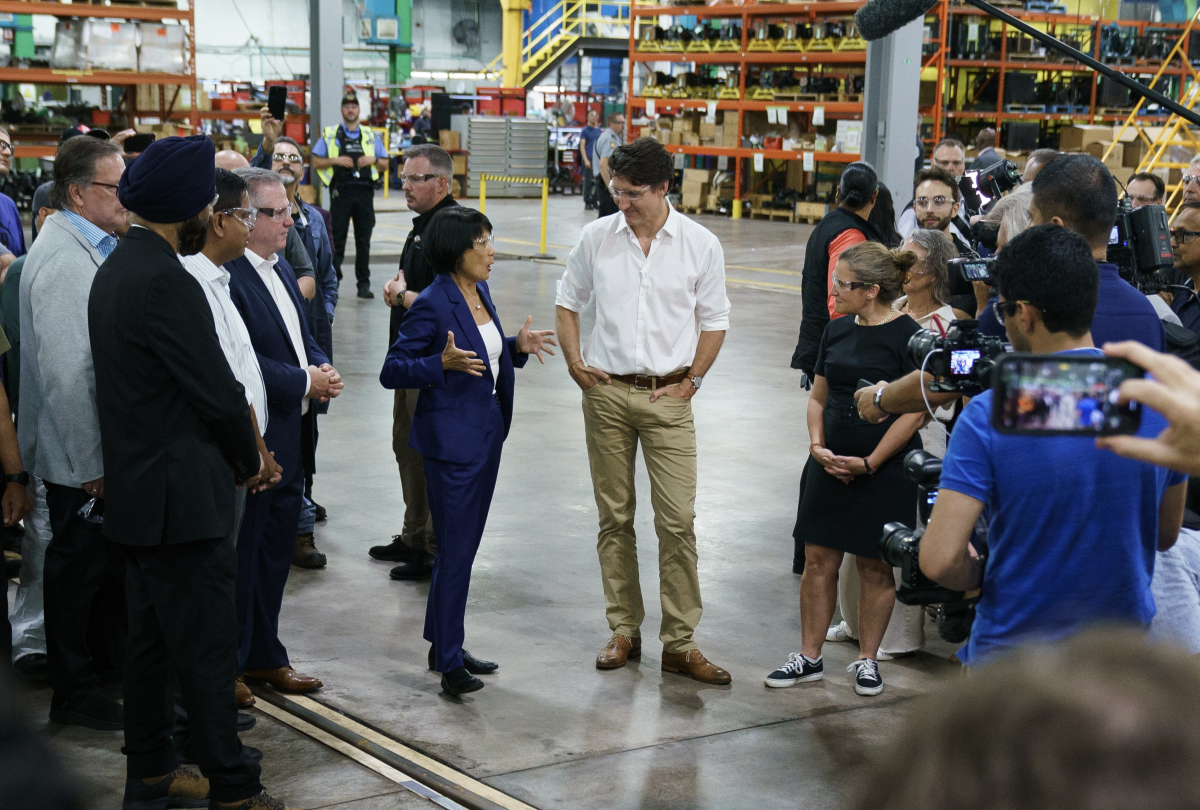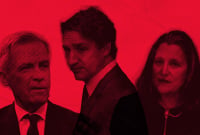Support strong Canadian climate journalism for 2025
Public transit advocates are criticizing a $30-billion plan to improve public transportation unveiled by Prime Minister Justin Trudeau on Wednesday.
Flanked by Deputy Prime Minister Chrystia Freeland and Toronto Mayor Oliva Chow at a Toronto Transit Commision (TTC) train yard, Trudeau said his government’s focus is on providing predictable, long-term transit funding to help municipalities plan for the future.
Trudeau called the investment the “largest public transit investment in Canadian history.” But for Nate Wallace, Environmental Defence’s clean transportation program manager, the announcement misses the mark almost entirely.
“We're quite disappointed because this transit funding announcement… is for a program that doesn't actually fund transit service,” Wallace told Canada’s National Observer.
The Canada Public Transit Fund will invest approximately $3 billion per year, over 10 years, in public transit by providing “baseline funding” that can be used to upgrade and replace things like buses and trains, as well as specific project-based funding for things like electrification and transportation in Indigenous communities. The money won’t start flowing until 2026 –– after the next federal election. None of it is going to cover day-to-day operations, which observers note is the major gap transit systems are dealing with right now.
Transit is expensive to operate, and in the pandemic years, municipalities were stretched thin as workers stayed home, exacerbating a ridership crisis years in the making. Cities began hiking fares and cutting service to make up for budget shortfalls, which saved money in the short term but discouraged use.
Due to these year-over-year budget shortfalls, totalling over $1 billion since the pandemic began, the TTC is now facing a potential “death spiral” of declining revenues and ensuing service cuts, according to The Globe and Mail. In Vancouver, TransLink expects a funding gap of $600 million in 2026, while Montreal’s transit authority, the Société de transport de Montréal (STM), anticipates a budget shortfall of $560 million next year, growing to nearly $700 million by 2028.
“It feels like this program is being announced in a separate universe. A universe where transit systems aren't facing massive operating deficits,” Wallace said. “Transit systems can't plan for the future if they're struggling to figure out how to keep the lights on today.”
While the kinds of capital funding the government announced this week are needed too, Wallace said it would be better to include funding that could be used to pay for operations, like hiring more drivers to increase routes available to riders. It does little good to have a new fleet of buses that can’t be put into service because there aren’t enough drivers, he said.
Simply put, having a reliable transit network that can get people where they need to go without long waits and crowded rides is what will encourage people to ditch their gas guzzlers for more efficient transportation, Wallace said.
That’s an important consideration, given greenhouse gas emissions from transportation make up about one-fifth of the country’s total emissions, and experts say public transportation can play a key role efficiently moving people from one place to another.
“Without this operations funding it will be hard for transit agencies to grow service at the pace required by the climate crisis,” Gideon Forman, David Suzuki Foundation climate change and transportation policy analyst, said in a statement. “Canada should aim to double public transit ridership by 2035.”
Denis Agar, executive director of Movement: Metro Vancouver Transit Riders, similarly scolded the government for its lack of operational funding.
“Riders and agencies have been asking for operating funding to run more buses but each level of government keeps pointing at each other,” Agar said in a statement. “How crowded does transit have to get before it becomes a political priority?”
The transit funding on offer does come with some strings. To tap the program, municipalities will be required to increase housing supply by taking steps like scrapping mandatory minimum parking requirements within 800 metres of high-frequency transit lines, allowing high density housing near public transit and near post-secondary schools, and completing a “housing needs assessment” for communities with more than 30,000 people.
NDP infrastructure and communities critic Bonita Zarrillo was not made available for an interview, but said in a statement that Trudeau has had nine years to fix transit, and hasn’t.
“Liberals continue to delay and disappoint—and don’t count on Pierre Poilievre to fix transit when he will cut investments altogether,” she said. “New Democrats want to change the rules so people can get reliable, accessible, affordable transit that will help us tackle the climate crisis, and create good paying jobs.”
The Bloc Québécois, Green Party, and Conservative Party of Canada did not return a request for comment by deadline.






Comments
I understand the reaction to the announcement, but how can we change the unfolding downward=spiraling situation if we do not take a different and holistic approach to what we are doing. Certainly, our current approach, that of the past many decades, is what has led us to this point. More of the same - pick your area of interest - will not result in a change for the better. The way we do everything must be on the table for examination and "re-design". Of course, there are concerns with the announcement: it is the announcement. Now, let's figure the best way ahead to take advantage of the funds.
"The Canada Public Transit Fund will invest approximately $3 billion per year, over 10 years… The money won’t start flowing until 2026 –– after the next federal election."
$30 B over a decade sounds like a lot. It's not.
Trudeau spent more on TMX pipeline.
Spread over ten years, it works out to $3 B a year. For the whole country. 40 million Canadians.
Compare:
-Edmonton Transit operating budget: $443 MM. (2024)
-LRT expansion capital budget (2023-2026): $3.5 B.
-Century Park to Ellerslie Road LRT extension: $1.34 B. (2024)
$3 B a year works out to $75 per capita per year. $750 per capita over a decade.
Compare federal EV subsidies, which largely flow to wealthy households that do not need them: $5,000 for purchase or 48 month lease of new EV.
The PBO estimates government support (for capital and operating expenses) across the EV supply chain to be up to $52.5 billion for corporate investments (Oct 2020 – April 2024) of $46.1 billion. Of the up to $52.5 billion in government support, PBO estimates federal support to be up to $31.4 billion (60%) and provincial support to be up to $21.1 billion (40%).
The federal government is spending far more per capita on affluent EV buyers than on non-drivers. Obscenely regressive policy.
The transit funding starts 2026 — unless the Conservatives cancel it.
Realistically, to meet Canada's needs, federal support for public transit should be in the tens and hundreds of billions.
The federal government is spending far more per capita to subsidize the fossil fuel industry than all transit and EV infrastructure combined. Let's start at the real starting point -- lowering the consumption of petroleum across the board.
UNLESS the conservatives cancel it? A given, along with ANYTHING environmental, etc. etc.
Should clarify the situation more than it seems to shouldn't it?
I'm with the NDP critic on this. Metro Vancouver went from a massive shortfall in transit funding under conservative governments provincially and federally to a huge injection of deperately needed investments under a neTrideau
...a newly elected Trudeau in Ottawa and John Horgan's breath of fresh air on Victoria.
Within weeks of their election the hugely important Broadway Subway was funded by a 40/40/20 split between the feds, the province and Metro's TransLink.
What happened since then? Trudeau dove into the bl
...the black depths of an oil pipeline and industry demands for public money for CCS. Horgan got distracted by LNG and roads.
By now the post analysis is done, and both could have turned the page to a better future if they tried. They didn't, and the federal announcement on transit seems to be just one more half measure which Trudeau is now an expert at.
When was the last time Trudeau took a bus or subway trip?